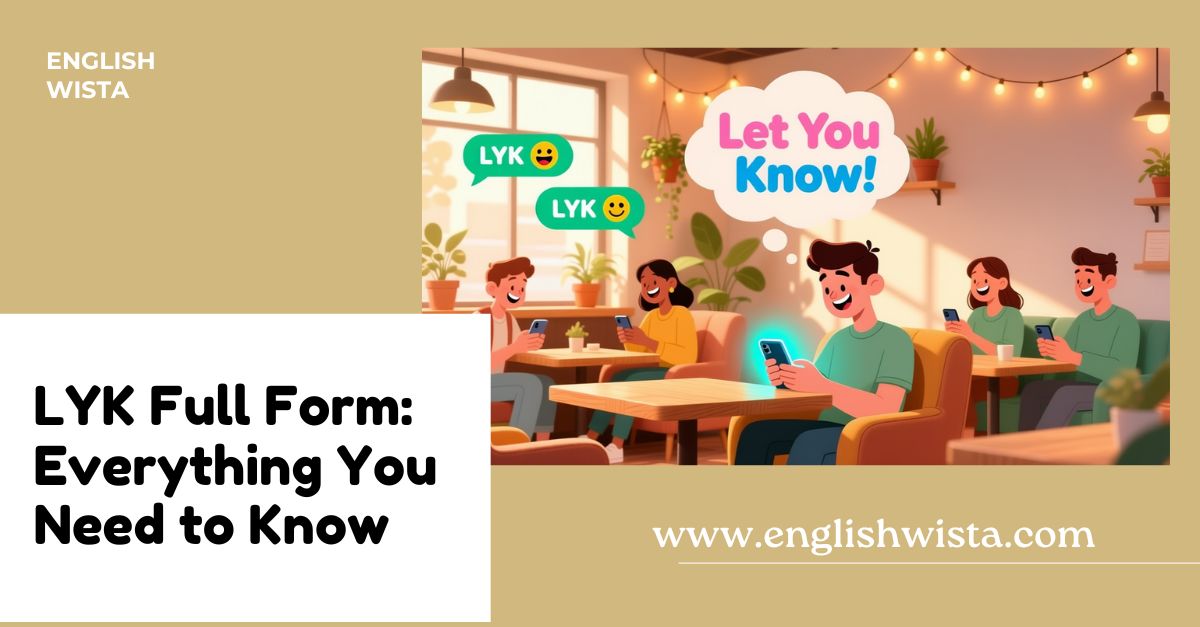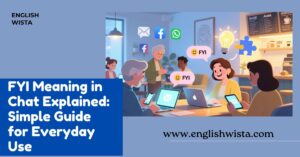Have you ever seen someone type “LYK” in a message and wondered what on earth it means? Don’t worry you’re not alone. In the world of internet slang, abbreviations, and texting shortcuts, it’s easy to feel a little lost sometimes. But that’s exactly why we’re here today!
In this article, we’re going to dive into the full form of LYK, explore how it’s used, and give you plenty of examples so you can feel confident using it yourself. We’ll also look at fun facts, similar abbreviations, and even a bit of history behind how people started writing like this online.
So grab a cup of tea (or coffee, if that’s more your style), and let’s explore the world of “LYK” together.
What Is the Full Form of LYK?
The full form of LYK is “Let You Know.”
It’s a common abbreviation used in texting, chatting, and on social media. Instead of typing out the full phrase “I’ll let you know,” people often shorten it to “I’ll LYK.”
This makes conversations faster, especially on phones where typing long sentences can feel like a bit of a chore.
Why Do People Use LYK?
The main reason people use “LYK” is convenience. Think about it: in casual conversations, we all love shortcuts. Just like we say “info” instead of “information” or “TV” instead of “television,” internet users shorten common phrases like “let you know” into “LYK.”
Another reason is tone. Using abbreviations makes your message feel friendly, casual, and modern. It’s perfect for chatting with friends, but you probably wouldn’t use it in a formal email to your boss.
How Do You Use LYK in a Sentence?
Here are some everyday examples where “LYK” fits perfectly:
- “I’m not sure about the plan yet, but I’ll LYK tomorrow.”
- “Can you LYK if the shop is still open?”
- “I’ll LYK once I reach home.”
- “Thanks for asking! I’ll LYK when I find out.”
See how simple that is? Each of these sentences could be written with “let you know,” but “LYK” saves time and adds that casual texting vibe.
Is LYK the Same as LMK?
This is a very common question. People often mix up LYK with LMK.
- LYK = Let You Know
- LMK = Let Me Know
They are opposites in meaning!
- If you say “I’ll LYK,” you’re telling someone that you will inform them.
- If you say “LMK,” you’re asking someone else to inform you.
Example:
- “I’ll LYK if I can come to the party.” (You will tell them later.)
- “LMK if you’re free tonight.” (You want them to tell you.)
It’s easy to confuse these two, but once you spot the difference, you’ll never forget it.
Where Do People Use LYK?
You’ll mostly see “LYK” in informal digital communication, such as:
- Text messages
- WhatsApp or Telegram chats
- Social media posts and comments
- Online forums
- Quick emails between friends
It’s not something you’ll usually find in professional or academic writing. Imagine sending your teacher an assignment with “I’ll LYK” written inside it might look a bit strange!
Can LYK Have Other Meanings?
Yes! While the most common full form is “Let You Know,” sometimes abbreviations can have multiple meanings depending on the context.
Some other, less common meanings of LYK include:
- Love You Kindly (a sweet and informal sign-off, though not very widely used)
- Lucky (shortened for fun in some chat groups)
- Last Year’s Knowledge (rare, usually in academic discussions)
But don’t worry 99% of the time, if someone types “LYK,” they mean “Let You Know.”
Is LYK Formal or Informal?
“LYK” is definitely informal. It belongs to the world of casual conversations, quick updates, and friendly chats.
If you’re writing:
- To your manager → Use “let you know” (write it out fully).
- To your friend → Feel free to use “LYK.”
Think of it like wearing pajamas versus a suit. Both are fine, but you choose one depending on where you are.
A Quick Definition of LYK
LYK (abbreviation): A short form of “Let You Know,” used in texting and online conversations to save time and keep messages casual.
A Bit of History: Where Did LYK Come From?
Abbreviations like “LYK” started becoming popular in the late 1990s and early 2000s. Why? Because texting was expensive, and people were charged per character or per message.
Shortening phrases helped save space and money. Instead of typing “I’ll let you know,” which takes 14 characters, you could just type “I’ll LYK,” which takes only 7.
Fast forward to today, even though messages are usually unlimited, people still love these shortcuts because they feel fast, fun, and casual.
Fun Examples Comparing LYK with Other Abbreviations
Let’s put “LYK” side by side with other popular abbreviations:
- BRB = Be Right Back
- TTYL = Talk To You Later
- OMG = Oh My God
- BTW = By The Way
- LYK = Let You Know
These all share the same purpose: making typing quick and easy while keeping conversations lighthearted.
Real-Life Scenarios Using LYK
To make things clearer, let’s look at some realistic conversations.
Scenario 1: Planning a Trip
- Alex: “Are you coming with us on Saturday?”
- Jamie: “Not sure yet. I’ll LYK by Friday.”
In Scenario 2: School or Work Project
- Friend: “Do you know the deadline?”
- You: “No, but I’ll ask the teacher and LYK.”
Scenario 3: Casual Chat
- Sam: “Are we still watching the movie tonight?”
- You: “Maybe! I’ll LYK after work.”
See how natural it feels?
Do People Say LYK Out Loud?
Great question! Usually, “LYK” is just for writing. People don’t really say “L-Y-K” in spoken conversations. Instead, they’ll simply say “I’ll let you know.”
So remember: LYK = written shortcut, not spoken word.
Common Mistakes with LYK
Some learners and beginners make small mistakes when using “LYK.” Let’s clear them up:
- Mixing it with LMK
- Wrong: “I’ll LMK tomorrow.”
- Right: “I’ll LYK tomorrow.”
- Using it in formal writing
- Wrong: “Dear Professor, I’ll LYK about my attendance.”
- Right: “Dear Professor, I will let you know about my attendance.”
- Adding extra letters
- Wrong: “LYKN” or “LYKK” (these don’t exist).
- Right: “LYK.”
Fun Facts About LYK and Internet Slang
- Some people call these types of abbreviations textese or chatspeak.
- The Oxford English Dictionary has even added popular ones like “LOL” and “OMG.” Who knows, maybe “LYK” will be there one day too!
- Teenagers and young adults are the most common users of “LYK,” but many adults have picked it up as well.
- Different cultures have their own versions of text slang. For example, in French, instead of “LYK,” people might shorten phrases in completely different ways.
Quick Recap
Let’s do a little summary to keep everything fresh in your mind:
- LYK full form = Let You Know.
- It’s used in texting and online chats.
- It’s informal, casual, and friendly.
- Don’t confuse it with LMK (Let Me Know).
- Best used in personal conversations, not formal writing.
- Example: “I’ll LYK if I can make it to dinner.”
Conclusion
So there you have it! The mystery of “LYK” is solved. It simply means “Let You Know,” and it’s one of those handy shortcuts that makes digital conversations faster and more fun.
Next time you see someone type “LYK,” you’ll know exactly what they mean. And even better, you can use it yourself with confidence. Just remember to save it for casual chats with friends, not serious work emails.
Language is always changing, and abbreviations like “LYK” are part of that evolution. They make communication quick, playful, and personal. And who doesn’t love saving a few seconds while texting?
So go ahead use “LYK” in your next conversation. And as they say in chatspeak: I’ll LYK if I think of more fun facts later!



